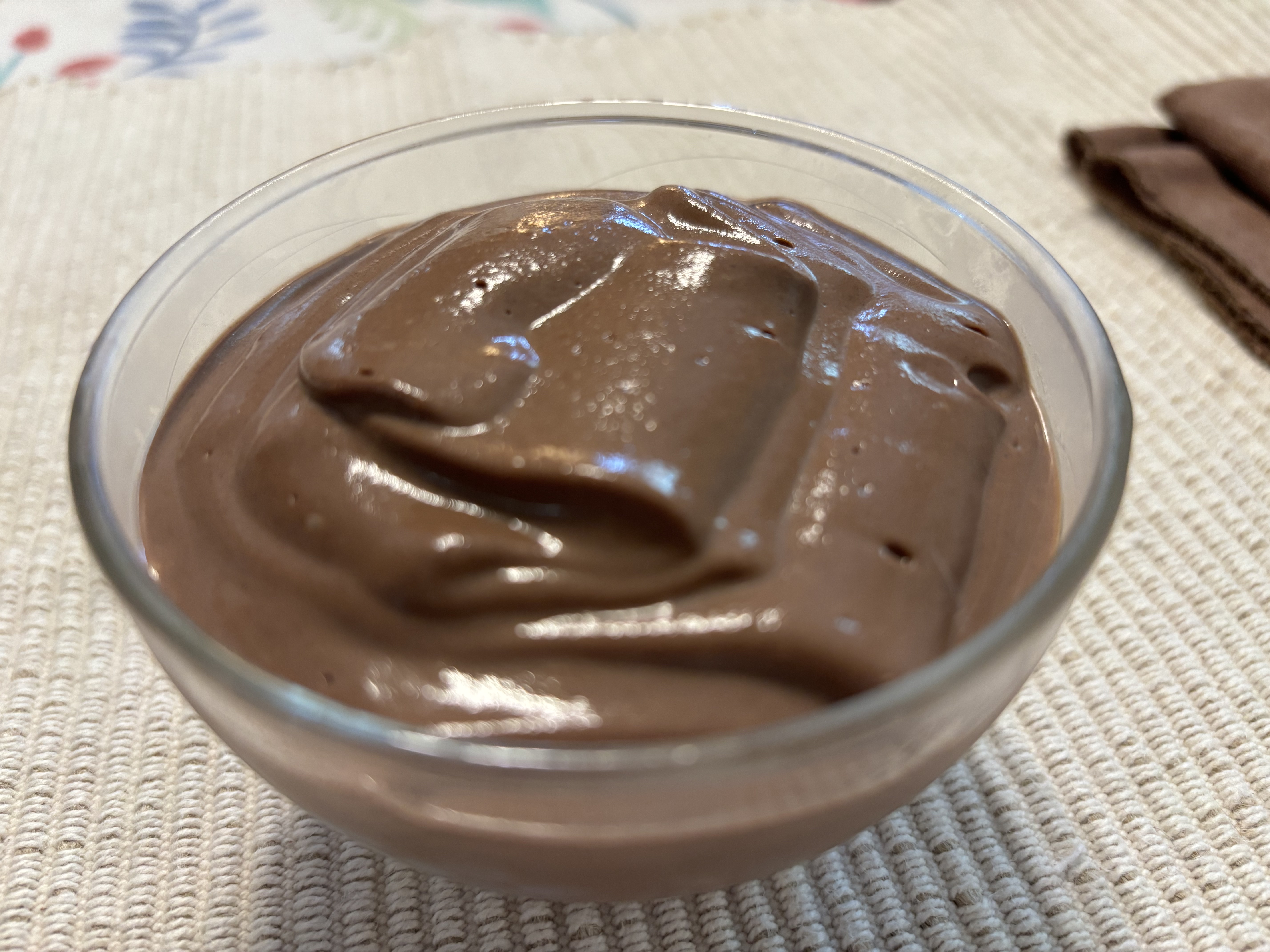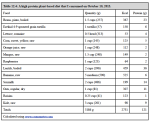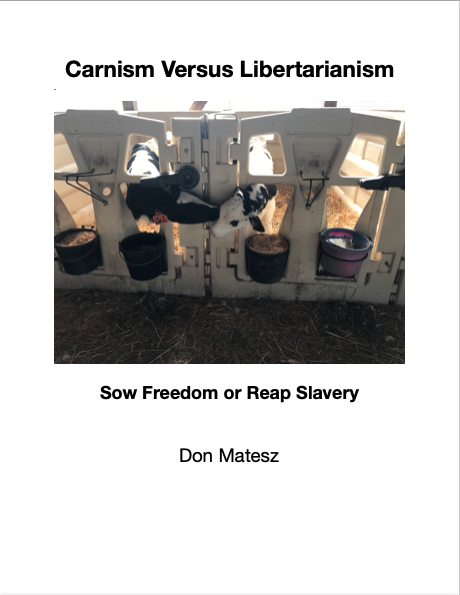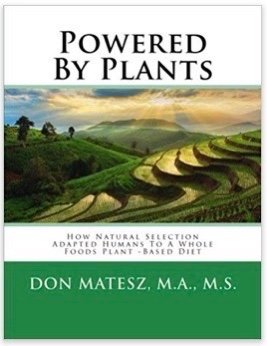Carnivore vs Vegetarian Diet: Nutrient Density Comparison
Carnivore vs vegetarian diet – which is more nutrient dense? Let's find out.
I will compare the nutrients supplied by two diets providing about 2600 kcal. The carnivore diet consists of beef steak, mince and eggs. The vegetarian diet is a whole foods plant based diet that includes just 2 cups (16 ounces) of 2% milk. I will compared both to the National Academy of Sciences Food and Nutrition Board Recommended Dietary Allowances for macro and micronutrients.
Some readers may say that I should analyze a carnivore diet that includes liver, bone broth, and other organ meats, or shellfish. I chose not to include these for the following reasons:
- First, there are leading carnivore diet promoters and practitioners who claim that steak alone is adequate for long term carnivores, and say/believe there is no need to eat liver or bone broth to satisfy nutritional requirements over short or long terms. This article is aimed at comparing a simple lactovegetarian diet to the exclusive carnivore diet consumed by these people, not the diet consumed by a comparatively much smaller group of people who may be meticulous in daily "carnivore" food choices in order to cover all nutritional bases.
- Second, most people consider both the texture and flavor of liver disgusting, which is itself evidence that humans are not natural exclusive carnivores (neither cats nor canines find liver disgusting). This point also applies to other organ meats. Most people are naturally averse to eating kidneys, intestines, pancreas, lungs, etc., a fact which is exploited by "carnivore" entrepreneurs who supply these organs as powders encapsulated as supplements. Ironically the very existence and success of a "carnivore supplements" industry that hides organ meats in capsules provides evidence that humans are disgusted by the eating of organs and will only consume them if they are hidden from view, which is strong evidence that humans are therefore not true exclusive carnivores.
- Third, bones concentrate lead and bone broth contains risky amounts of lead. Therefore if I included bone broth I would be including a known neurotoxin in the meal plan. Furthermore, I very much doubt that all followers of the exclusive carnivore diet consume bone broth every day. I have followed several on social media and I have rarely seen posts featuring meals including bone broth. Most often I see steak, mince or eggs, or some combination of those three.
- Fourth, very few people regularly eat shellfish, which is a good thing because shellfish are the primary vectors of food borne illness in the U.S.A., responsible for more than 5 million cases of norovirus infection in 2011. Again, I have not witnessed carnivores posting meals that include shellfish other than shrimp, which, unlike oysters, mussels and the like, are not particularly rich in trace minerals other than iodine, which is well supplied by beef and eggs anyway.
Carnivore vs Vegetarian Diet: The Carnivore Diet
Here's the Cronometer.com analysis of a carnivore diet consisting of 800 g beef and 8 large eggs.
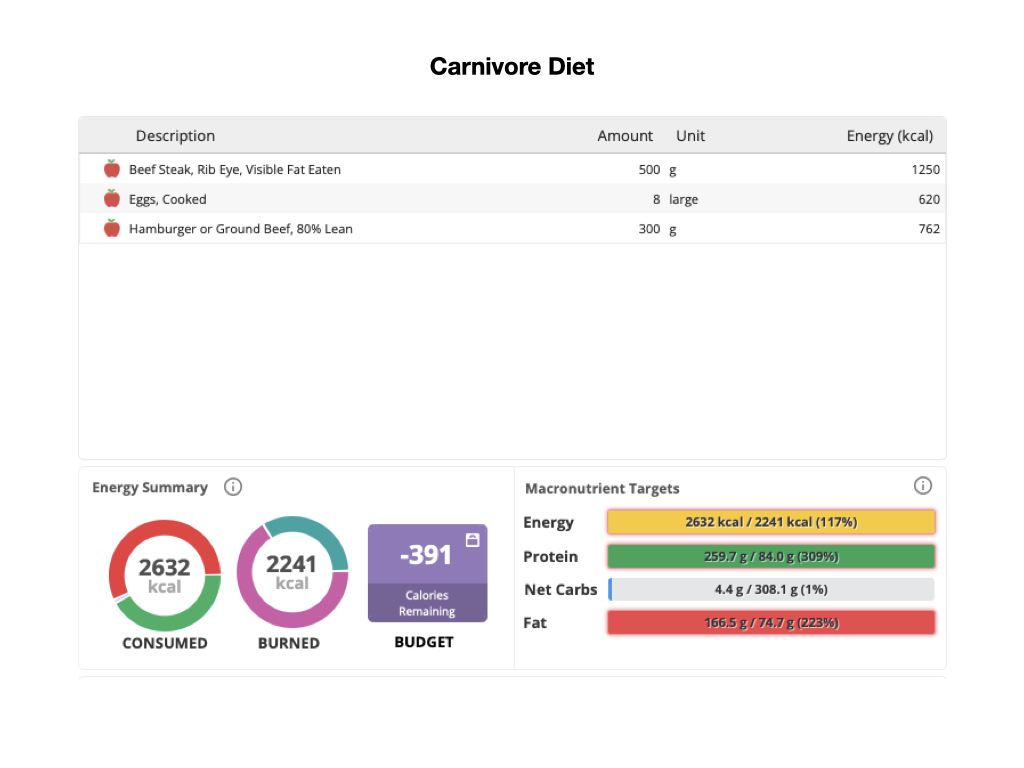
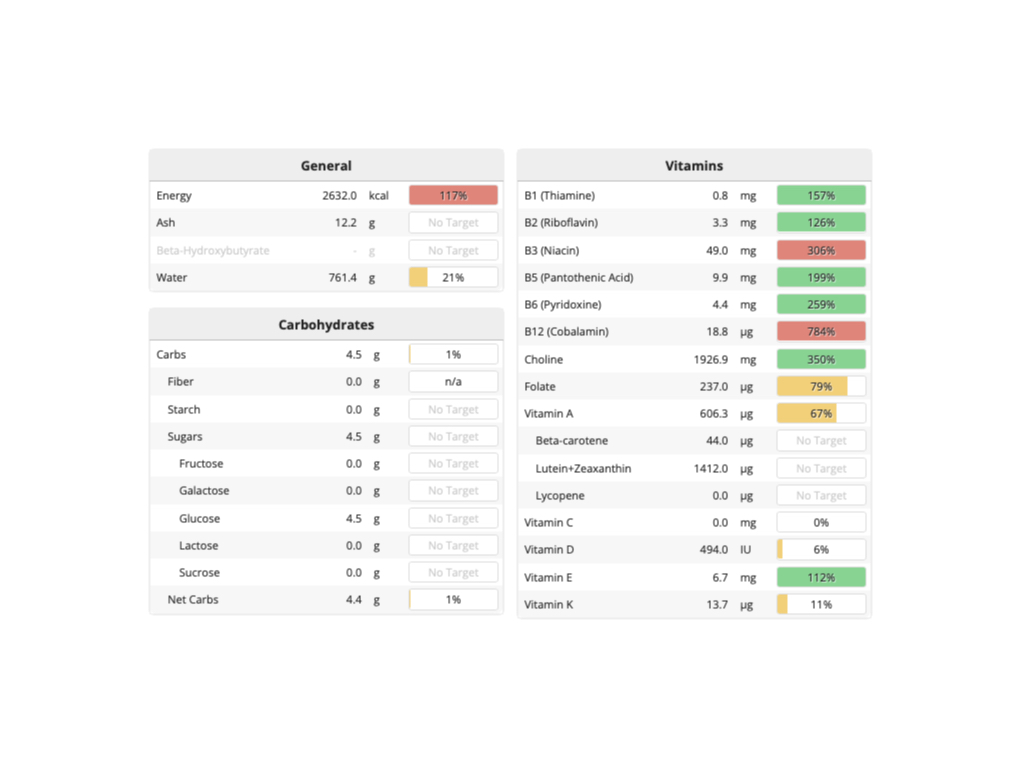
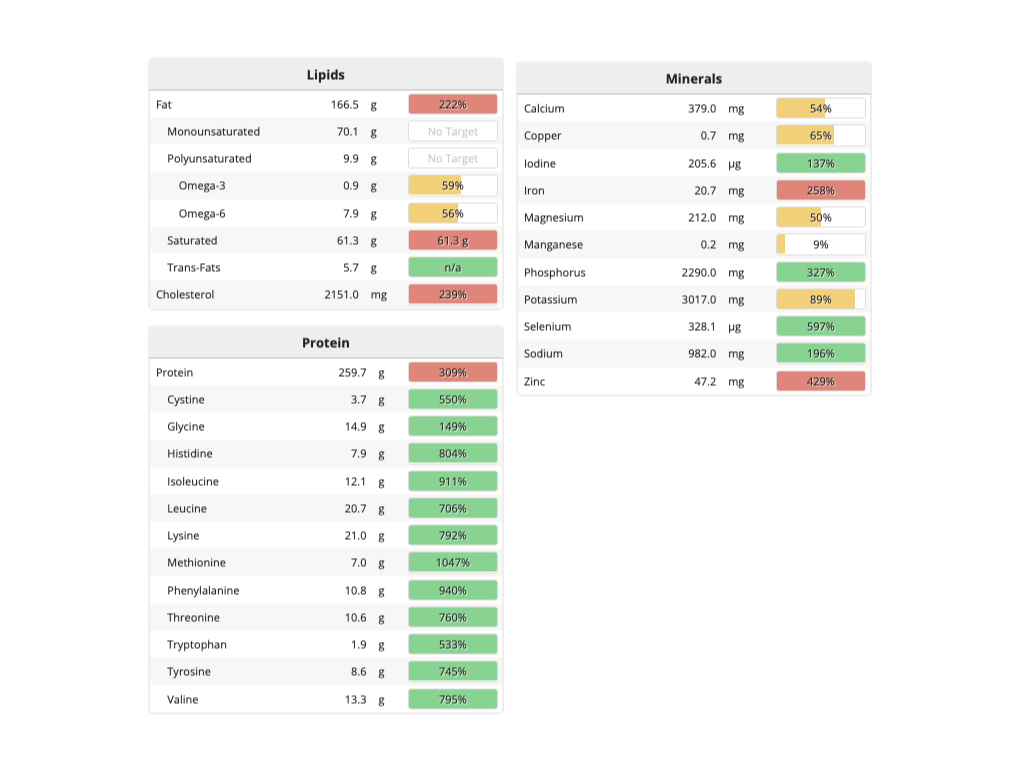
Carnivore vs Vegetarian Diet: The Vegetarian Diet
Here's the Cronometer.com analysis of the lactovegetarian whole foods plant based diet for the carnivore vs. vegetarian diet comparison.
This diet consists of a selection of whole plant foods that could make a simple, inexpensive lactovegetarian diet.
- Breakfast: Oatmeal, hemp seeds, lecithin granules (stir into hot oats), apple, 2% milk
- Lunch: 4 sweet potatoes, 2 T peanut butter, flax seeds, 2% milk
- Supper: Whole wheat pasta, chickpeas, broccoli, mushrooms, pumpkin seeds, apple
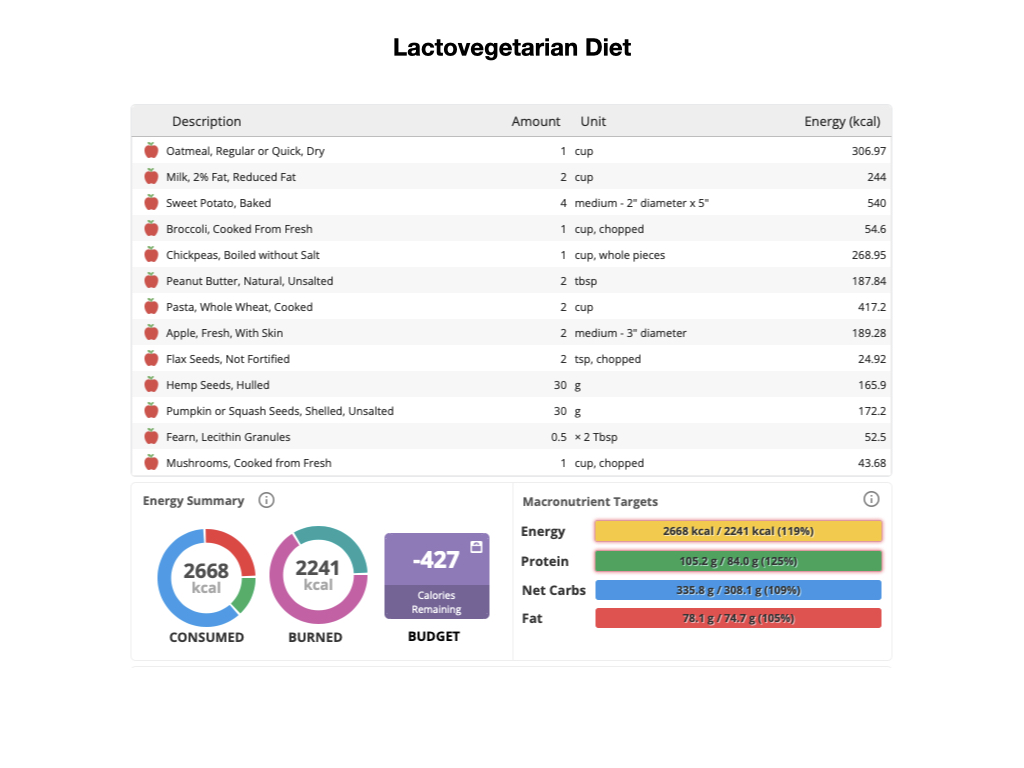
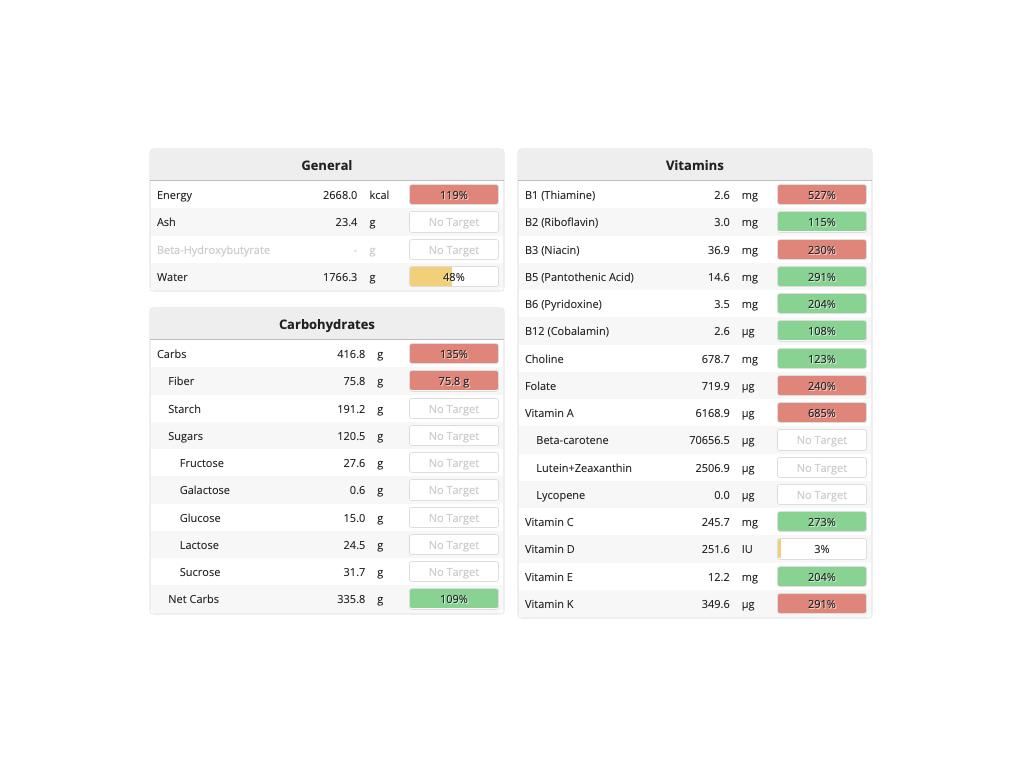
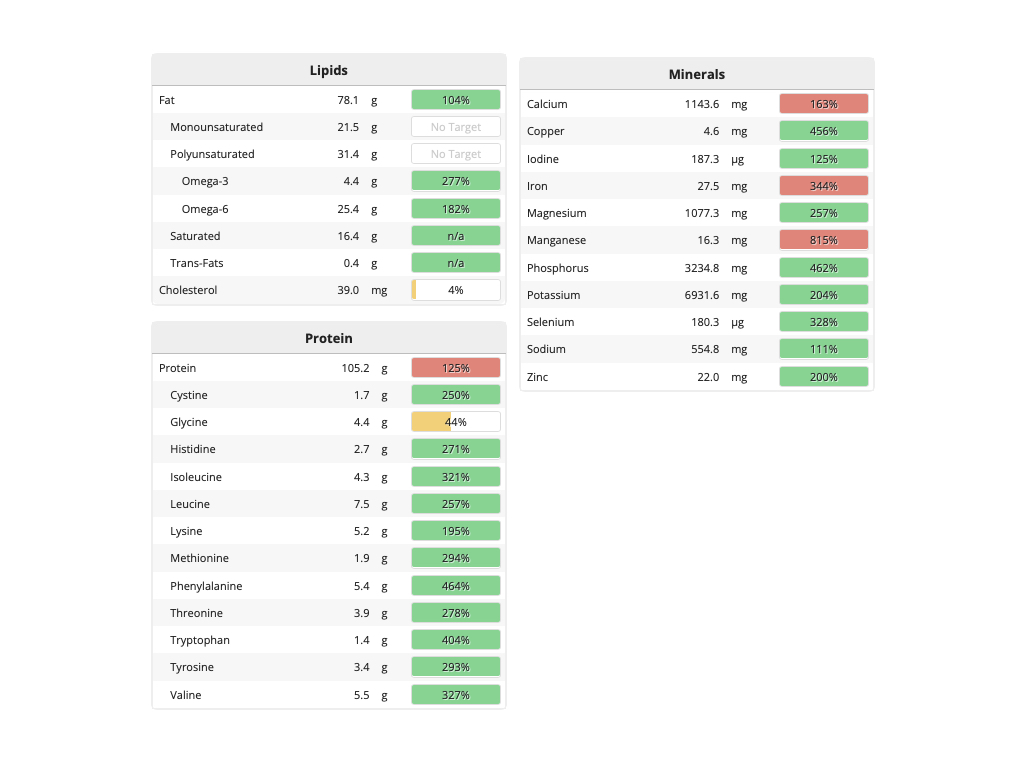
Carnivore vs Vegetarian Diet Nutrient Density Comparison
I have taken the data from the Cronometer.com analysis and put it into a table to enable us to do a side-by-side carnivore vs vegetarian diet nutrient density comparison.
Let's start with macronutrients.
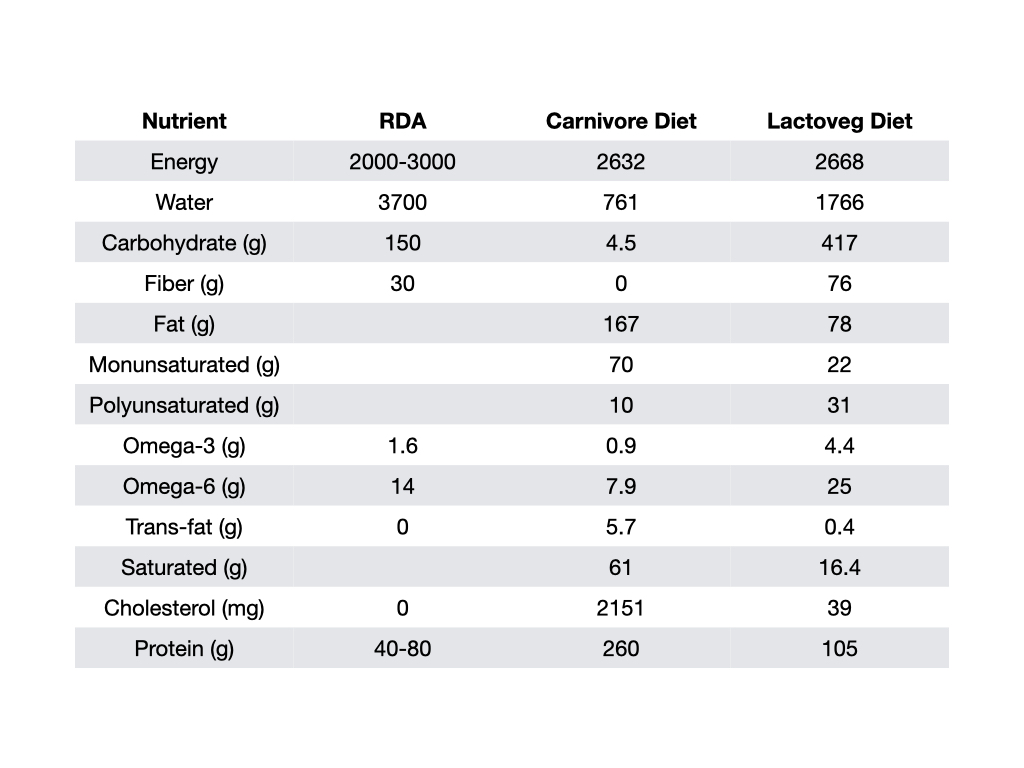
This carnivore vs vegetarian diet comparison shows both diets provide about 2650 kcal, about the requirements of a physically active 70 kg male.
- The foods composing the lactovegetarian diet provide more than half the daily water requirement, whereas the foods composing the carnivore diet provide only 21% of the daily water requirement. The carnivore diet probably increases the water requirement because it provides 260 grams of protein, more than 3 times the recommended intake, which will result in generation of a large amount of ammonia and urea waste that must be diluted with water.
- Notably, the vegetarian diet provides 105 g of protein. Using the RDA of 0.8 g/kg, this vegetarian diet provides enough protein for a 131 kg (288 pound) individual. For a 70 kg individual, 105 g of protein amounts to 1.5 g/kg, nearly double the RDA. Although the diet includes only 16 grams of animal protein (only 15% of total protein) from 2 cups of 2% milk, and no soy products nor isolated protein supplements, it provides 2-4 times recommended intakes of all essential amino acids.
- The carnivore diet provides less than 5 g of carbohydrate, which is less than 4% of the Institute of Medicine's recommended minimum intake of 150 g daily.
- The carnivore diet provides no fiber, whereas the vegetarian diet provides more than twice the recommended minimum intake.
- The carnivore diet fails to provide adequate omega-3 fatty acids, offering only 56% of the recommended daily intake of omega-3 fatty acids. In contrast, the vegetarian diet provides 2.75 times the recommended omega-3 intake.
- The carnivore diet fails to supply the recommended intake of omega-6 fatty acids, falling short by 44%, while the vegetarian diet supplies 79% more than the recommended intake of these essential fatty acids.
- The carnivore diet provides 6 times more saturated fat than polyunsaturated fat, while the vegetarian diet provides nearly twice as much polyunsaturated fat as saturated fat. The American Heart Association recommends "For good health, the majority of the fats that you eat should be monounsaturated or polyunsaturated. Eat foods containing monounsaturated fats and/or polyunsaturated fats instead of foods that contain saturated fats and/or trans fats." The vegetarian diet satisfies this recommendation, the carnivore diet does not.
- Since the human body can manufacture all the saturated fats and cholesterol it needs as needed, there is no dietary requirement for either saturated fat or cholesterol. The carnivore diet provides more than 2 grams daily of cholesterol, while the lactovegetarian diet provides only 39 mg.
So far in this carnivore vs vegetarian diet comparison, the carnivore diet has proved inferior to the vegetarian diet as a source of five nutrients: water, digestible carbohydrate, fiber, omega-3 fats, and omega-6 fats. The vegetarian diet supplies plenty of protein, while the carnivore diet supplies an enormous excess. The carnivore diet also supplies an excess of two unnecessary lipids, saturated fats and cholesterol.
Let's move on to vitamins.
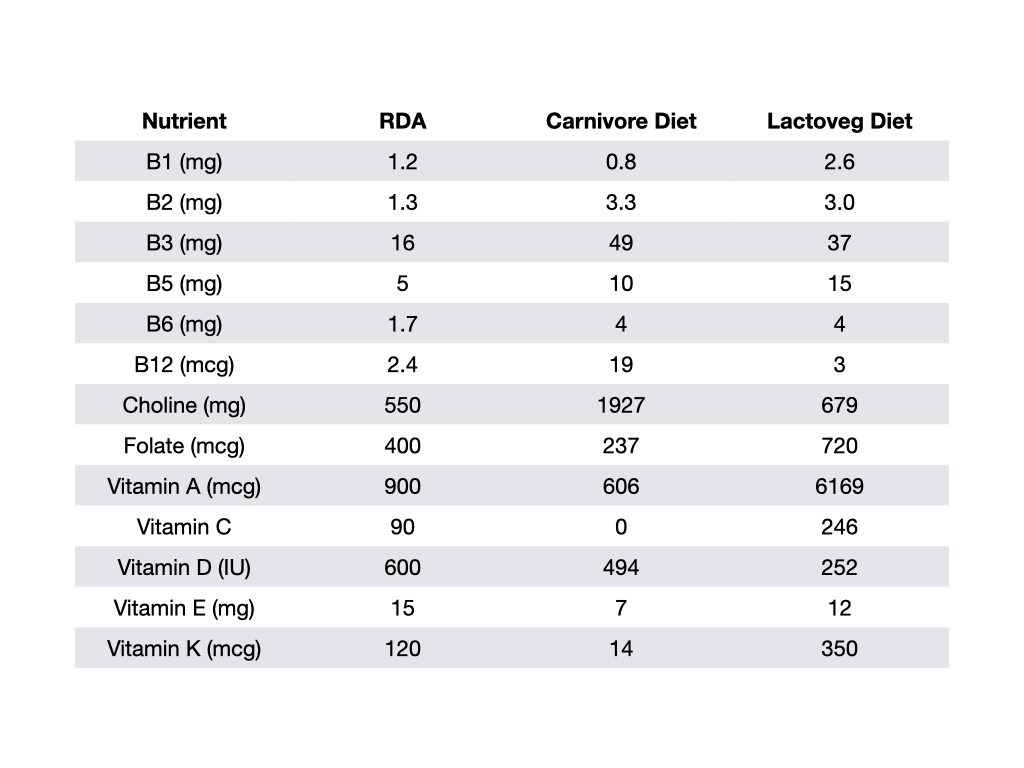
- The vegetarian diet supplies more than twice the RDA for vitamin B1 (thiamin) and more than 3 times as much B1 as provided by the carnivore diet, which supplies only two-thirds of the recommended intake.
- Both the carnivore and the vegetarian diet provide more than twice the recommended intake of vitamin B2 (riboflavin).
- Both the diets provide more than twice the recommended intake of vitamin B3 (niacin).
- The vegetarian diet provides 50% more vitamin B5 (pantothenic acid) than the carnivore diet, although both diets provide at least twice the recommended intake.
- Both diets provide more than double the recommended intake of vitamin B6 (pyridoxine).
- Both diets provide more than the recommended intake of vitamin B12. The vegetarian diet provides just a little more than the recommended intake, while the carnivore diet provides about 8 times the recommended intake. Note that 2 cups of milk provides more than the recommended intake of vitamin B12 for the vegetarian diet. The lactovegetarian diet does not need a B12 supplement, in contrast to a vegan diet.
- Both diets provide more than the recommended intake of choline. I included granular soy lecithin in the vegetarian diet as an excellent source of choline.
- The carnivore diet fails to provide the recommended intake of folate. Muscle meats and egg yolks are poor sources of folate; adding liver to this diet would improve its folate content. The vegetarian diet provides 80% more folate than recommended.
- The carnivore diet fails to provide the recommended intake of vitamin A activity, while the vegetarian diet provides more than 6 times the recommended intake of vitamin A activity, in the form of non-toxic carotenoids that the body can convert to retinol vitamin A as needed. As I discussed in Powered by Plants, we have evidence that carotenoids prevent cancer and promote longevity.
- The carnivore diet evidently provides no vitamin C, whereas the vegetarian diet provides more than 2.5 times the recommended intake.
- The carnivore diet provides less than half the recommended intake of vitamin E, while the vegetarian diet provides 80% of the recommendation. Nuts and seeds are the best dietary sources of vitamin E, and absent from the carnivore diet.
- The carnivore diet provides only 12% of the recommended vitamin K intake, while the vegetarian diet provides almost 3 times the recommendation.
Thus, the carnivore diet falls spectacularly short of recommendations for 6 of 12 vitamins – folate and vitamins A, B1, C, E, and K. In contrast, the vegetarian diet only fell slightly short of the recommendation for 1 of the 12, vitamin E, which the carnivore diet failed to provide even half. Note, there are no animal source foods rich in vitamin E.
The vitamin content of the carnivore diet would be improved by inclusion of 1-2 ounces of liver, but I did not include it because 1) there are proponents of the "carnivore" diet who claim it is not necessary to eat organ meats, and many followers of carnivore ideology eat only muscle meat and eggs, and 2) most people find liver disgusting, not appetizing, which is in itself evidence that humans are not designed to consume liver or an exclusive meat diet.
Thus, the vegetarian diet is far superior to the carnivore diet for meeting vitamin requirements.
Now let's look at minerals.
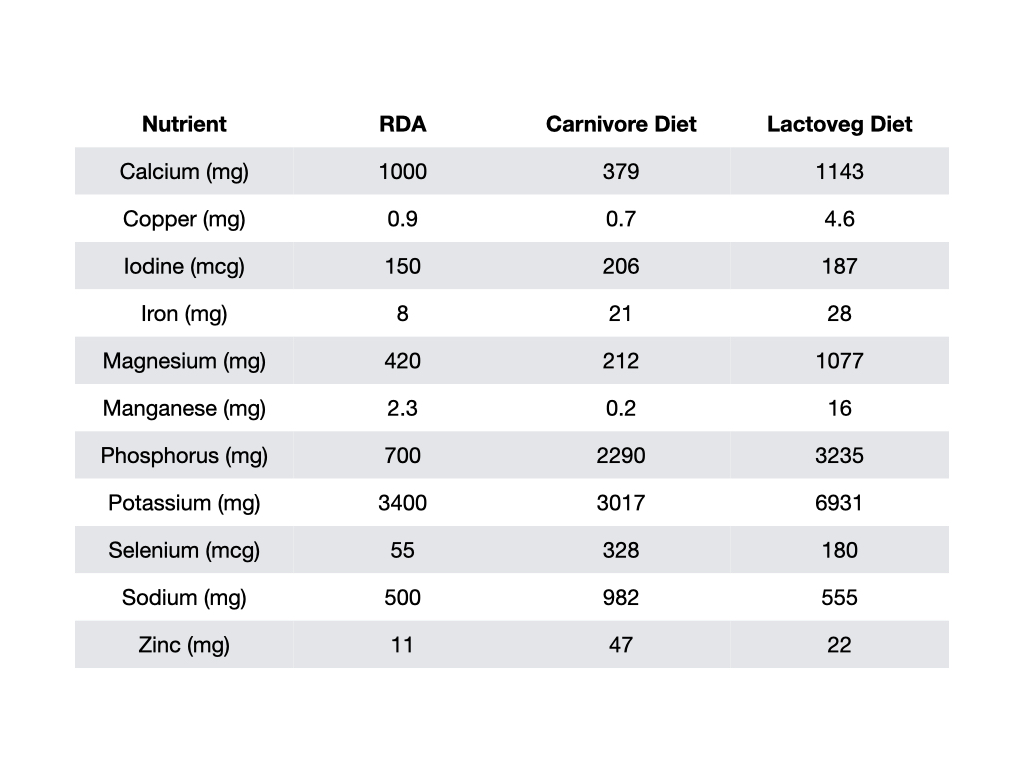
The carnivore diet fails to supply adequate intakes of 5 of 10 essential minerals: calcium, copper, magnesium, manganese, and potassium. It provides only 38% of recommended calcium intake, about half of recommended magnesium intake, 9% of recommended manganese intake, 80% of recommended copper intake, and 90% of recommended potassium intake.
The vegetarian diet provides more than adequate intakes for all essential minerals. Note that the whole foods plant based vegetarian diet provides:
- more than 3 times the iron requirement
- more than 2 times the magnesium requirement
- more than 7 times the manganese requirement
- more than 2 times the potassium requirement
- more than 3 times the selenium requirement
- 2 times the zinc requirement
Regarding bioavailability, there is no evidence of mineral deficiency caused in humans by a diet of whole plant foods due exclusively to fiber- or phytate-induced reduced bioavailability. Fruits and vegetables supply organic acids including citric and ascorbic, which counter the mineral-binding effects of fiber and phytate and enhance mineral absorption. As shown, the crude supply of minerals so greatly exceeds requirements that even if we can only absorb half of these minerals from these foods, we will still get plenty. So long as the diet is adequate in energy, protein, and fruits and vegetables, so-called "antinutrients" are a "nothing-burger."
So we see once again in this carnivore vs vegetarian diet comparison that the vegetarian diet is significantly more nutrient-dense than the carnivore diet.
Most people can easily meet essential nutrient requirements eating a simple lactovegetarian whole foods plant based diet without using any protein supplements or micronutrient pills.
In conclusion:
A properly planned whole foods plant based lactovegetarian diet is nutritionally far superior to a typical meat-and-eggs-only carnivore diet.
Recent Articles
-
Ancient Roman Soldier Diet
Apr 14, 25 05:19 PM
A discussion of the ancient Roman soldier diet, its staple foods and nutritional value, and a vegan minimalist version. -
High Protein Chocolate Tofu Pudding
Jul 01, 24 12:41 PM
A delicious high protein chocolate tofu pudding. -
Vegan Macrobiotic Diet For Psoriasis
Sep 05, 23 06:36 PM
Vegan macrobiotic diet for psoriasis. My progress healing psoriasis with a vegan macrobiotic diet. -
How Every Disease Develops
Aug 04, 23 06:22 PM
How every disease develops over time, according to macrobiotic medicine. -
Why Do People Quit Being Vegan?
Jun 28, 23 08:04 PM
Why do people quit being vegan? How peer pressure and ego conspire against vegans. -
Powered By Plants
Mar 16, 23 08:01 PM
Powered By Plants is a book in which I have presented a lot of scientific evidence that humans are designed by Nature for a whole foods plant-based diet. -
Carnism Versus Libertarianism
Dec 30, 22 01:55 PM
Carnism Versus Libertarianism is an e-book demonstrating that carnism is in principle incompatible with libertarianism, voluntaryism, and anarchism. -
The Most Dangerous Superstition Book Review
Nov 15, 22 08:46 PM
Review of the book The Most Dangerous Superstition by Larken Rose.

